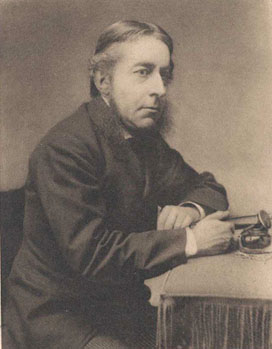| Joseph Henry Shorthouse  Born: 9-Sep-1834 Born: 9-Sep-1834
Birthplace: Birmingham, Warwickshire, England
Died: 4-Mar-1903
Location of death: Edgbaston, Warwickshire, England
Cause of death: unspecified
Gender: Male
Race or Ethnicity: White
Sexual orientation: Straight
Occupation: Novelist Nationality: England
Executive summary: John Inglesant English novelist, born in Great Charles Street, Birmingham, on the 9th of September 1834. He was the eldest son of Joseph Shorthouse, chemical manufacturer, and Mary Ann, daughter of John Hawker, of the same town. He was educated at Grove House, Tottenham, where he proved a promising and industrious pupil, and upon leaving school entered his father's business, in which he was all his life actively engaged. He married, in 1857, Sarah, daughter of John Scott, of Birmingham. His literary interest was fostered by a local essay club, to which he contributed many papers. It was not until he was nearly fifty years old that Shorthouse made his public appearance as an author, and even then his remarkable story, John Inglesant, had undergone vicissitudes. It was kept for over three years in manuscript, and the author eventually printed one hundred copies for private circulation. One of these found its way into the hands of Mrs. Humphry Ward, who recommended it to the Macmillan publishers. Its first appearance was a quiet one; but Gladstone was at once struck by its quality, and made its reputation by his praise. It became the most discussed book of the day, and its author was suddenly famous. Besides John Inglesant (1881), Shorthouse published The Little Schoolmaster Mark (1883), Sir Percival (1886), The Countess Eve and A Teacher of the Violin (1888), and Blanche, Lady Falaise (1891); but none of these has been so popular as his first novel. He will always remain known to fame as "the author of John Inglesant." Shorthouse was originally a Quaker, but the appeal of the Anglican Church was insistent with him, and he was baptized into its body before the appearance of his story. Something of his own stress of religious transition appears in the character of his hero, who is pictured as living in the time of the Civil War, a pupil of the Jesuits, a philosopher and a Platonist, who is yet true to the National Church. The story, which is deeply mystical and imaginative, has for its central idea the dangers of bigotry and superstition, and the necessity of intuitive religion to progress and culture. It is a work full of opulent color and crowded life, no less than of philosophy and spiritual beauty. Shorthouse's work was always marked by high earnestness of purpose, a luxuriant style and a genuinely spiritual quality. He lacked dramatic faculty and the workmanlike conduct of narrative, but he had almost every other quality of the born novelist. He died at Edgbaston on the 4th of March 1903.
Father: Joseph Shorthouse (chemical manufacturer)
Mother: Mary Ann Hawker
Wife: Sarah Scott (m. 1857)
High School: Grove House, Tottenham
Author of books:
John Inglesant (1881, novel)
The Little Schoolmaster Mark (1883, novel)
Sir Percival (1886, novel)
The Countess Eve (1888, novel)
A Teacher of the Violin (1888, novel)
Blanche, Lady Falaise (1891, novel)
Do you know something we don't?
Submit a correction or make a comment about this profile
Copyright ©2019 Soylent Communications
|